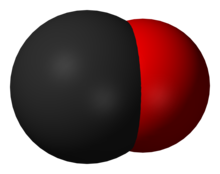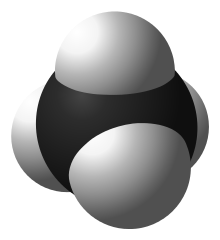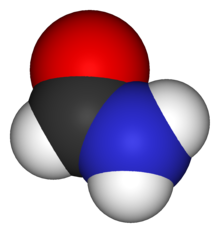This is a list of molecules that have been detected in the interstellar medium and circumstellar envelopes, grouped by the number of component atoms. The chemical formula is listed for each detected compound, along with any ionized form that has also been observed.
Detection
The molecules listed below were detected by spectroscopy. Their spectral features are generated by transitions of component electrons between different energy levels, or by rotational or vibrational spectra. Detection usually occurs in radio, microwave, or infrared portions of the spectrum.[1]Interstellar molecules are formed by chemical reactions within very sparse interstellar or circumstellar clouds of dust and gas. Usually this occurs when a molecule becomes ionized, often as the result of an interaction with a cosmic ray. This positively charged molecule then draws in a nearby reactant by electrostatic attraction of the neutral molecule's electrons. Molecules can also be generated by reactions between neutral atoms and molecules, although this process is generally slower.[2] The dust plays a critical role of shielding the molecules from the ionizing effect of ultraviolet radiation emitted by stars.[3]
History
The chemistry of life may have begun shortly after the Big Bang, 13.8 billion years ago, during a habitable epoch when the Universe was only 10–17 million years old.[4][5]The first carbon-containing molecule detected in the interstellar medium was the methylidyne radical (CH•) in 1937.[6] From the early 1970s it was becoming evident that interstellar dust consisted of a large component of more complex organic molecules (COMs),[7] probably polymers. Chandra Wickramasinghe proposed the existence of polymeric composition based on the molecule formaldehyde (H2CO).[8] Fred Hoyle and Chandra Wickramasinghe later proposed the identification of bicyclic aromatic compounds from an analysis of the ultraviolet extinction absorption at 2175 Å,[9] thus demonstrating the existence of polycyclic aromatic hydrocarbon molecules in space.
In 2004, scientists reported[10] detecting the spectral signatures of anthracene and pyrene in the ultraviolet light emitted by the Red Rectangle nebula (no other such complex molecules had ever been found before in outer space). This discovery was considered a confirmation of a hypothesis that as nebulae of the same type as the Red Rectangle approach the ends of their lives, convection currents cause carbon and hydrogen in the nebulae's core to get caught in stellar winds, and radiate outward.[11] As they cool, the atoms supposedly bond to each other in various ways and eventually form particles of a million or more atoms. The scientists inferred[10] that since they discovered polycyclic aromatic hydrocarbons (PAHs) — which may have been vital in the formation of early life on Earth — in a nebula, by necessity they must originate in nebulae.[11]
In 2010, fullerenes (or "buckyballs") were detected in nebulae.[12] Fullerenes have been implicated in the origin of life; according to astronomer Letizia Stanghellini, "It's possible that buckyballs from outer space provided seeds for life on Earth."[13]
In October 2011, scientists found using spectroscopy that cosmic dust contains complex organic compounds ("amorphous organic solids with a mixed aromatic-aliphatic structure") that could be created naturally, and rapidly, by stars.[14][15][16] The compounds are so complex that their chemical structures resemble the makeup of coal and petroleum; such chemical complexity was previously thought to arise only from living organisms.[14] These observations suggest that organic compounds introduced on Earth by interstellar dust particles could serve as basic ingredients for life due to their surface-catalytic activities.[17][18] One of the scientists suggested that these compounds may have been related to the development of life on Earth and said that, "If this is the case, life on Earth may have had an easier time getting started as these organics can serve as basic ingredients for life."[14]
In August 2012, astronomers at Copenhagen University reported the detection of a specific sugar molecule, glycolaldehyde, in a distant star system. The molecule was found around the protostellar binary IRAS 16293-2422, which is located 400 light years from Earth.[19][20] Glycolaldehyde is needed to form ribonucleic acid, or RNA, which is similar in function to DNA. This finding suggests that complex organic molecules may form in stellar systems prior to the formation of planets, eventually arriving on young planets early in their formation.[21]
In September 2012, NASA scientists reported that PAHs, subjected to interstellar medium (ISM) conditions, are transformed, through hydrogenation, oxygenation, and hydroxylation, to more complex organics — "a step along the path toward amino acids and nucleotides, the raw materials of proteins and DNA, respectively".[22][23] Further, as a result of these transformations, the PAHs lose their spectroscopic signature which could be one of the reasons "for the lack of PAH detection in interstellar ice grains, particularly the outer regions of cold, dense clouds or the upper molecular layers of protoplanetary disks."[22][23]
PAHs are found everywhere in deep space[24] and, in June 2013, PAHs were detected in the upper atmosphere of Titan, the largest moon of the planet Saturn.[25]
In 2013, Dwayne Heard at the University of Leeds suggested[26] that quantum mechanical tunneling could explain a reaction his group observed taking place, at a significantly higher than expected rate, between cold (around 63 kelvins) hydroxyl and methanol molecules, apparently bypassing intramolecular energy barriers which would have to be overcome by thermal energy or ionization events for the same rate to exist at warmer temperatures. The proposed tunneling mechanism may help explain the common observation of fairly complex molecules (up to tens of atoms) in interstellar space.
A particularly large and rich region for detecting interstellar molecules is Sagittarius B2 (Sgr B2). This giant molecular cloud lies near the center of the Milky Way galaxy and is a frequent target for new searches. About half of the molecules listed below were first found near Sgr B2, and nearly every other molecule has since been detected in this feature.[27] A rich source of investigation for circumstellar molecules is the relatively nearby star CW Leonis (IRC +10216), where about 50 compounds have been identified.[28]
In March 2015, NASA scientists reported that, for the first time, complex DNA and RNA organic compounds of life, including uracil, cytosine and thymine, have been formed in the laboratory under outer space conditions, using starting chemicals, such as pyrimidine, found in meteorites. Pyrimidine, like polycyclic aromatic hydrocarbons (PAHs), the most carbon-rich chemical found in the Universe, may have been formed in red giants or in interstellar dust and gas clouds, according to the scientists.[29]
In October 2016, astronomers reported that the very basic chemical ingredients of life—the carbon-hydrogen molecule (CH•, or methylidyne radical), the carbon-hydrogen positive ion (CH+ cation) and the carbon ion (C+ cation)—are the result, in large part, of ultraviolet light from stars, rather than in other ways, such as the result of turbulent events related to supernovae and young stars, as thought earlier.[30][31]
Theoretical models
To explain the observed ratios of isomeric compounds, the minimum energy principle has been used. In the majority of cases, it explains that some organic entities have greater abundance than their isomers due to the lower total energies of the first one. However, a few exceptions where the principle fails are also known.[32]Another approach ignores energy and deals only with the molecular complexity estimated by the information entropy index. It speculates that the points of several natural compounds (urea, pyrimidine, dihydroxyacetone, uracil, cytosine, glycine, and alanine) fall into the range of the values typical for the known interstellar molecules that indicates high probability of their detection in interstellar environment. Additionally the molecules with maximal information entropy, i.e. the most complex compounds, make up approximately a half of the interstellar set and their percentage is decreased with the size. This trend may be associated with the different stabilities of the molecules with uniform (usually more stable) and diversified (usually less stable) chemical structures, so the detectable molecules with a large size must possess symmetric structure more probably than non-symmetric. The remarkable detection of low-entropy (highly symmetric) fullerene molecules supports this assumption. It is also noted that information entropy reflects the depth of hydrogenation of interstellar entities: the molecules with maximal information entropy are hydrogen-poor whereas the others are mainly hydrogen-rich.[33]
Molecules
The following tables list molecules that have been detected in the interstellar medium, grouped by the number of component atoms. If there is no entry in the molecule column, only the ionized form has been detected. For molecules where no designation was given in the scientific literature, that field is left empty. Mass is given in atomic mass units. The total number of unique species, including distinct ionization states, is listed in parentheses in each section header.Most of the molecules detected so far are organic. Only one inorganic species has been observed in molecules which contain at least five atoms, SiH4.[34] Larger molecules have so far all had at least one carbon atom, with no N−N or O−O bonds.[34]
Diatomic (43)
Triatomic (41)
Formaldehyde is an organic molecule that is widely distributed in the interstellar medium.[105]
Four atoms (27)
| Molecule | Designation | Mass | Ions |
|---|---|---|---|
| CH3 | Methyl radical[106] | 15 | — |
| l-C3H | Propynylidyne[36][107] | 37 | l-C3H+[108] |
| c-C3H | Cyclopropynylidyne[109] | 37 | — |
| C3N | Cyanoethynyl[110] | 50 | C3N−[111] |
| C3O | Tricarbon monoxide[107] | 52 | — |
| C3S | Tricarbon sulfide[36][78] | 68 | — |
| — | Hydronium | 19 | H3O+[112] |
| C2H2 | Acetylene[113] | 26 | — |
| H2CN | Methylene amidogen[114] | 28 | H2CN+[46] |
| H2CO | Formaldehyde[105] | 30 | — |
| H2CS | Thioformaldehyde[115] | 46 | — |
| HCCN | —[116] | 39 | — |
| HCCO | Ketenyl[117] | 41 | — |
| — | Protonated hydrogen cyanide | 28 | HCNH+[91] |
| — | Protonated carbon dioxide | 45 | HOCO+[118] |
| HCNO | Fulminic acid[119] | 43 | — |
| HOCN | Cyanic acid[120] | 43 | — |
| HOOH | Hydrogen peroxide[121] | 34 | — |
| HNCO | Isocyanic acid[101] | 43 | — |
| HNCS | Isothiocyanic acid[122] | 59 | — |
| NH3 | Ammonia[36][123] | 17 | — |
| HSCN | Thiocyanic acid[124] | 59 | — |
| SiC3 | Silicon tricarbide[36] | 64 | — |
| HMgNC | Hydromagnesium isocyanide[125] | 51.3 | — |
Methane, the primary component of natural gas, has also been detected on comets and in the atmosphere of several planets in the Solar System.[126]
Five atoms (19)
| Molecule | Designation | Mass | Ions |
|---|---|---|---|
| — | Ammonium ion[127][128] | 18 | NH+ 4 |
| CH4 | Methane[129] | 16 | — |
| CH3O | Methoxy radical[130] | 31 | — |
| c-C3H2 | Cyclopropenylidene[47][131][132] | 38 | — |
| l-H2C3 | Propadienylidene[132] | 38 | — |
| H2CCN | Cyanomethyl[133] | 40 | — |
| H2C2O | Ketene[101] | 42 | — |
| H2CNH | Methylenimine[134] | 29 | — |
| HNCNH | Carbodiimide[135] | 42 | — |
| — | Protonated formaldehyde | 31 | H2COH+[136] |
| C4H | Butadiynyl[36] | 49 | C4H−[137] |
| HC3N | Cyanoacetylene[36][47][91][138][139] | 51 | — |
| HCC-NC | Isocyanoacetylene[140] | 51 | — |
| HCOOH | Formic acid[141][138] | 46 | — |
| NH2CN | Cyanamide[142] | 42 | — |
| — | Protonated cyanogen | 53 | NCCNH+[143] |
| HC(O)CN | Cyanoformaldehyde[144] | 55 | — |
| SiC4 | Silicon-carbide cluster[71] | 92 | — |
| SiH4 | Silane[145] | 32 | — |
Six atoms (16)
| Molecule | Designation | Mass | Ions |
|---|---|---|---|
| c-H2C3O | Cyclopropenone[147] | 54 | — |
| E-HNCHCN | E-Cyanomethanimine[148] | 54 | — |
| C2H4 | Ethylene[149] | 28 | — |
| CH3CN | Acetonitrile[101][150][151] | 40 | — |
| CH3NC | Methyl isocyanide[150] | 40 | — |
| CH3OH | Methanol[101][152] | 32 | — |
| CH3SH | Methanethiol[153] | 48 | — |
| l-H2C4 | Diacetylene[36][154] | 50 | — |
| — | Protonated cyanoacetylene | 52 | HC3NH+[91] |
| HCONH2 | Formamide[146] | 44 | — |
| C5H | Pentynylidyne[36][78] | 61 | — |
| C5N | Cyanobutadiynyl radical[155] | 74 | — |
| HC2CHO | Propynal[156] | 54 | — |
| HC4N | —[36] | 63 | — |
| CH2CNH | Ketenimine[131] | 40 | — |
| C5S | —[157] | 92 | — |
Acetaldehyde (above) and its isomers vinyl alcohol and ethylene oxide have all been detected in interstellar space.[158]
Seven atoms (11)
| Molecule | Designation | Mass | Ions |
|---|---|---|---|
| c-C2H4O | Ethylene oxide[159] | 44 | — |
| CH3C2H | Methylacetylene[47] | 40 | — |
| H3CNH2 | Methylamine[160] | 31 | — |
| CH2CHCN | Acrylonitrile[101][150] | 53 | — |
| H2CHCOH | Vinyl alcohol[158] | 44 | — |
| C6H | Hexatriynyl radical[36][78] | 73 | C6H−[132][161] |
| HC4CN | Cyanodiacetylene[101][139][150] | 75 | — |
| HC5O | —[162] | 77 | — |
| CH3CHO | Acetaldehyde[36][159] | 44 | — |
| CH3NCO | Methyl isocyanate[163] | 57 | — |
Eight atoms (11)
| Molecule | Designation | Mass |
|---|---|---|
| H3CC2CN | Methylcyanoacetylene[165] | 65 |
| H2COHCHO | Glycolaldehyde[166] | 60 |
| HCOOCH3 | Methyl formate[101][138][166] | 60 |
| CH3COOH | Acetic acid[164] | 60 |
| H2C6 | Hexapentaenylidene[36][154] | 74 |
| CH2CHCHO | Propenal[131] | 56 |
| CH2CCHCN | Cyanoallene[131][165] | 65 |
| CH3CHNH | Ethanimine[167] | 43 |
| C7H | Heptatrienyl radical[168] | 85 |
| NH2CH2CN | Aminoacetonitrile[169] | 56 |
| (NH2)2CO | Urea[170] | 60 |
Nine atoms (10)
| Molecule | Designation | Mass | Ions |
|---|---|---|---|
| CH3C4H | Methyldiacetylene[171] | 64 | — |
| CH3OCH3 | Dimethyl Ether[172] | 46 | — |
| CH3CH2CN | Propionitrile[36][101][150] | 55 | — |
| CH3CONH2 | Acetamide[131][146] | 59 | — |
| CH3CH2OH | Ethanol[173] | 46 | — |
| C8H | Octatetraynyl radical[174] | 97 | C8H−[175][176] |
| HC7N | Cyanohexatriyne or Cyanotriacetylene[36][123][177][178] | 99 | — |
| CH3CHCH2 | Propylene (propene)[179] | 42 | — |
| CH3CH2SH | Ethyl mercaptan[180] | 62 | — |
A number of polyyne-derived chemicals are among the heaviest molecules found in the interstellar medium.
Ten or more atoms (17)
| Atoms | Molecule | Designation | Mass | Ions |
|---|---|---|---|---|
| 10 | (CH3)2CO | Acetone[101][181] | 58 | — |
| 10 | (CH2OH)2 | Ethylene glycol[182][183] | 62 | — |
| 10 | CH3CH2CHO | Propanal[131] | 58 | — |
| 10 | CH3OCH2OH | Methoxymethanol[184] | 62 | — |
| 10 | CH3C5N | Methyl-cyano-diacetylene[131] | 89 | — |
| 10 | CH3CHCH2O | Propylene oxide[185] | 58 | — |
| 11 | HC8CN | Cyanotetra-acetylene[36][177] | 123 | — |
| 11 | C2H5OCHO | Ethyl formate[186] | 74 | — |
| 11 | CH3COOCH3 | Methyl acetate[187] | 74 | — |
| 11 | CH3C6H | Methyltriacetylene[131][171] | 88 | — |
| 12 | C6H6 | Benzene[154] | 78 | — |
| 12 | C3H7CN | n-Propyl cyanide[186] | 69 | — |
| 12 | (CH3)2CHCN | iso-Propyl cyanide[188][189] | 69 | — |
| 13 | C 6H 5CN |
Benzonitrile[190] | 104 | — |
| 13 | HC10CN | Cyanopentaacetylene[177] | 147 | — |
| 60 | C60 | Buckminsterfullerene (C60 fullerene)[191] |
720 | C+ 60[192][193] |
| 70 | C70 | C70 fullerene[191] | 840 | — |
Deuterated molecules (20)
These molecules all contain one or more deuterium atoms, a heavier isotope of hydrogen.| Atoms | Molecule | Designation |
|---|---|---|
| 2 | HD | Hydrogen deuteride[194][195] |
| 3 | H2D+, HD+ 2 |
Trihydrogen cation[194][195] |
| 3 | HDO, D2O | Heavy water[196][197] |
| 3 | DCN | Hydrogen cyanide[198] |
| 3 | DCO | Formyl radical[198] |
| 3 | DNC | Hydrogen isocyanide[198] |
| 3 | N2D+ | —[198] |
| 4 | NH2D, NHD2, ND3 | Ammonia[195][199][200] |
| 4 | HDCO, D2CO | Formaldehyde[195][201] |
| 4 | DNCO | Isocyanic acid[202] |
| 5 | NH3D+ | Ammonium ion[203][204] |
| 6 | NH 2CDO; NHDCHO |
Formamide[202] |
| 7 | CH2DCCH, CH3CCD | Methylacetylene[205][206] |
Unconfirmed (13)
Evidence for the existence of the following molecules has been reported in scientific literature, but the detections are either described as tentative by the authors, or have been challenged by other researchers. They await independent confirmation.| Atoms | Molecule | Designation |
|---|---|---|
| 2 | SiH | Silylidine[88] |
| 4 | PH3 | Phosphine[207] |
| 4 | MgCCH | Magnesium monoacetylide[157] |
| 4 | NCCP | Cyanophosphaethyne[157] |
| 5 | C5 | Linear C5[43] |
| 5 | H2NCO+ | —[208] |
| 4 | SiH3CN | Silyl cyanide[157] |
| 10 | H2NH2CCOOH | Glycine[209][210] |
| 12 | CO(CH2OH)2 | Dihydroxyacetone[211] |
| 12 | C2H5OCH3 | Ethyl methyl ether[212] |
| 18 | C 10H+ 8 |
Naphthalene cation[213] |
| 24 | C24 | Graphene[214] |
| 24 | C14H10 | Anthracene[10][215] |
| 26 | C16H10 | Pyrene[10] |










